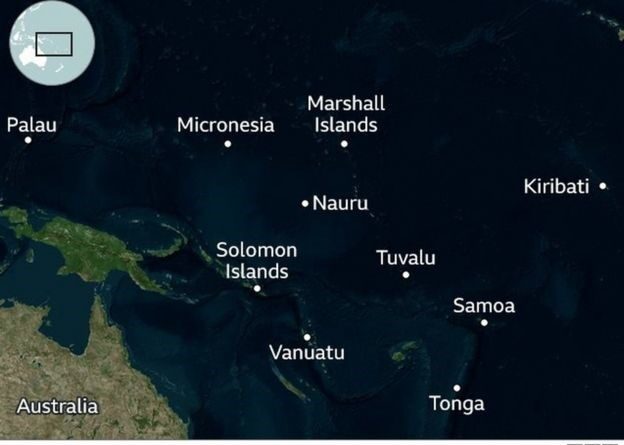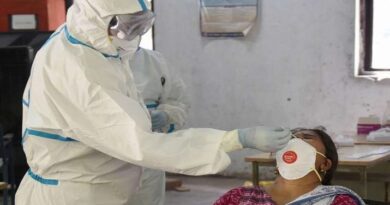10 countries of the world where there is not a single case of corona
The corona virus epidemic has made its impact in almost every country of the world, except for these 10 countries. But are these countries really ineffective with Covid-19? And the question is, what are they doing now?
The ‘Palau Hotel’ opened in 1982 was a ‘big thing’ at that time, this hotel had a great name because there was no other hotel at that time.
Since then, this small country surrounded by the sky-colored Pacific Ocean has enjoyed a full boom in tourism.
Nearly 90 thousand tourists reached Palau in 2019, that is, about five times the total population of this country.
In 2017, IMF data shows that ’40 percent of the country’s GDP comes from tourism.’
But these are all things before Kovid.
Palau’s borders are closed since the last days of March. Around the same time when the first lockdown was announced in India. However, Palau is one of the 10 countries in the world (excluding North Korea and Turkmenistan) where there is no official case of corona infection.
But without infecting any humans, the corona virus has destroyed this country.
The Palau Hotel has been closed since March, and is no longer alone. All the restaurants in Palau are empty. The shops where tourists used to buy gifts are closed. And only those hotels are open which are giving the facility of quarantine to the citizens of Palau returning from abroad.
10 countries where no case of Kovid-19
Palau
Micronesia
Marshall Islands
Nauru
Kiribati
Solomon Islands
Tuvalu
Samoa
Vanuatu
Tonga
Brian Lee, manager of The Palau Hotel, says, “The sea here is so much more beautiful than anywhere in the world.”
According to him, it is the blue sea color of the sky that keeps them busy. Before Kovid, about 70-80 percent of the 54 rooms of his hotel were filled all the time. But after the borders were closed, they had no work.
Brian says that “this is a small country, so the locals won’t stop coming to the Palau Hotel.”
There are about 20 employees in his team and they have all hired so far, although their working hours have been reduced.
He says, “I try to find work for them every day. Like maintenance work, renovation of a part or something like that.”
But maintenance and renovation work in empty hotels cannot be done forever. Brian says, “I can run this way for six more months, but in the end I have to close the hotel.”
Bryan does not blame the government for this situation, which has offered financial assistance to the residents of Palau, and the biggest thing – the Corona virus epidemic, has been successfully kept out of the country.
He says that “the government has done a good job at its level”. But if this is the condition of the oldest and frozen hotel in Palau, then there is a need to make some changes soon.
The President of Palau has recently announced that ‘essential air journeys can resume by September 1’. Meanwhile, this rumor was also heard that there was talk with Taiwan on building an ‘air corridor’ of Palau, which would allow tourists to come.
However, Brian feels that this is not going to happen soon.
He says, “The government needs to start reopening the business. Perhaps starting air-bubbles for tourists with New Zealand or other countries of that sort will help. Otherwise there will be no business worth living here.”
Marshall Islands, which are still Corona Free, are located across the vast Pacific Ocean, some 4000 kilometers east of Palau. But like Palau, not having a corona infection does not mean that there is no effect.
Hotel Robert Reimers is a renowned hotel here. Its location is fantastic. Before Kovid, about 75-88% of the 37 rooms of the hotel were full. Tourists from mainly Asia and America used to reach here.
But since the borders are closed, the hotel has 3-5 percent work left.
Sophia Fowler, who works for this hotel group, says that “We already had a limited number of visitors from the outlying islands, but the lockdown ended everything.”
Nationally, the Kovid-19 is expected to create more than 700 jobs in the Marshall Islands, the biggest drop since 1997. Of these, 258 jobs are expected to go into the hotel and restaurant sector.
But the ‘self-isolation’ of the Marshall Islands has been affected more by tourism, as Marshall Island has less dependence on tourism than Palau. The bigger problem here is the closure of the fish industry.
To keep the country covid-free, boats from infected countries have been banned from entering the ports of Marshall Islands. Instructions have been given for 14 days to stand in the sea before entry of fuel tankers and other big boats including container ships. Fishing licenses have been canceled and cargo flights have also been cut.
In short, you can keep the virus out of the country, but you cannot defeat it. Kovid-19 can affect you if not one, but the other way.
However, Sophia hopes that ‘things will be good soon’.
Some countries have been really poor due to the closure of borders due to Kovid-19, but not everyone wants the borders to be opened again.
Dr. Len Tarivonda is the director of the Department of Public Health in Vanuatu. They work in Port Villa, a capital region with a population of three lakhs. He himself belongs to Ambe whose population Is about 10,000.
He says, “If you talk to the people of Ambe, you will find that people are advocating to keep the borders closed. They believe that the borders should be kept closed until the epidemic is over, because they have a lot of fear of the epidemic. Is. They don’t want to face it. “
According to Dr. Len Tarivonda, about 80 percent of Vanuatu people are outside the cities and the ‘formal economy’.
According to Tarivonda, “They do not mind the bandh, they are the farmers who produce their own food, they are dependent on the local, traditional economy”.
Nevertheless, the country finds it difficult to save itself from harm. The Asian Development Bank estimates that Vanuatu’s GDP will decline by about 10%, which will be Vanuatu’s biggest decline since independence in 1980. It is believed that the effect of Kovid will be here for a long time.
In July, Vanuatu’s government had planned to reopen its borders to some ‘safe’ countries by 1 September. But in Australia and New Zealand, the plan was scrapped due to rising cases again.
Doctor Tarivonda says that despite the trouble and the need to open the border, Vanuatu will not make any haste. He gives an example of Papua New Guinea, stating that there was no case till the end of July. But he made haste, and the infection spread like fire there. That is why we are worried.
So what can these Kovid-free countries do?
The short-term solution is to ‘provide some financial support to workers and business people’. And the only long-term solution is to ‘wait for the corona vaccine’.
Till then, expectations can be expected from the ‘air-bubble’ to bring passengers here. But the opinion of the experts is that it is not as easy to say, it is easy to implement.
And as seen with Vanuatu’s ‘September Plan’ – Air Bubble related plans can ‘burst’ very easily. Because Australia and New Zealand have now made it clear that they will try the air-bubble plan with each other first.
According to Jonathan Preke, director of the Pacific Island Program at the Lovie Institute, there is no doubt that internationally these countries had no choice but to self-isolate.
He says, “If these countries had kept their borders open, then Australia and New Zealand, important for tourism, would not have opened their borders because both countries had also closed their borders.”
“So it is definitely a double whammy. There is an infection and disease, as well as an economic crisis. It may take years to find the right answer as to who took the right decision and what was wrong in the Corona period. But looking back However, the decision to keep these countries’ borders off the Pacific Ocean may never be misunderstood. “




